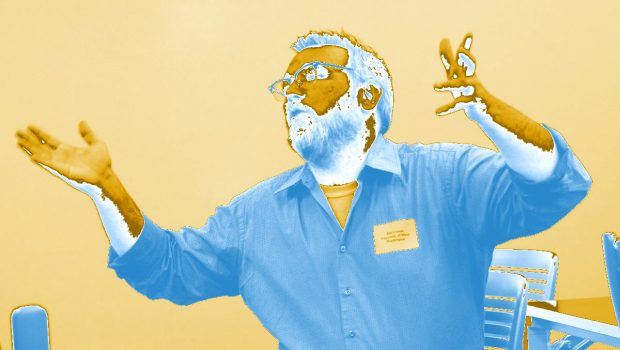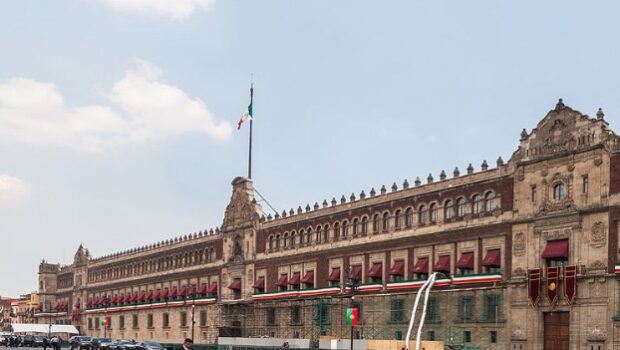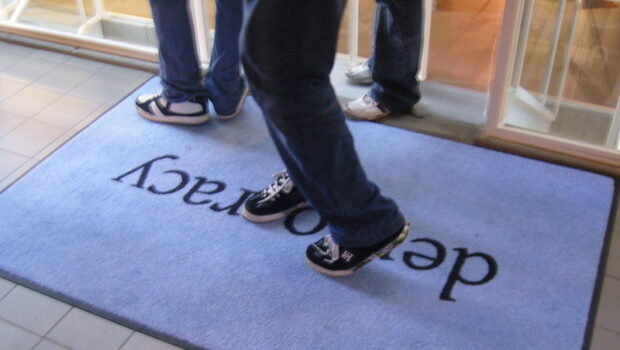The Dangers of Totalitarianism
El peligro del totalitarismo
Agnes Heller
To you, what were the most important subjects in the symposium?
I listened to the second session. And I think three very important questions were asked. The first question, which was criticized, was that of how world leaders should treat the conflicts of the world. As if to avert conflict would be like a mathematical equation. It would be a solution, a good solution. But these conflicts cannot be solved. Mostly, they can’t. They must be handled,, they must be kept under control, but they are not matematical equations. People are not numbers. Second, there was a very important issue raised about whether in a democracy, we need a cultural elite. Basically people believe that we don’t, because everything is about quantity and not quality, but that’s wrong. I think those participants who raised the questions in spirit, were right. Democracy needs a cultural elite. And the third issue was about education. Whether our educational institutions should be like a marketing institution, that produces kids for the market and behaves as a market.
How did our education become so market-oriented?
It happened in the last half-century. Education became market-oriented in two senses. Educational institutions behaved as institutions of the market. They became a market. They were producing young people for certain kinds of professions and young people took a kind of profession in order to get a better salary and a better position. And that’s all wrong, and it’s wrong even from the standpoint of technology, even from the standpoint of physics, chemistry. Because if you teach young people Physics, or Chemistry, which is actually the leading branch in science, the moment they finish school, it won’t be important anymore for these branches of science. But if you learn something general, universal; if you learn higher Mathematics, higher Physics, Greek or Latin language or Logic and Philosophy; all these capacities or abilities to argue and think in abstract notions, to think logically, to concentrate and to contemplate and to memorize; you’ve learned everything that you can actually use later on. It is not specialized subject matter, but you can use it all.
How do you see the 21st century? Is it going to get better or worse?
I don’t see the 21st century, we are at the beginning of it. Think, at the beginning of the 20th century, think about 1912, whether you could have forseen what was going to happen in 1914 or 1933, or 1942. It was impossible. So I think that at the present moment, right now, 2012, one hundred years after 1912, we cannot possibly know what is going to happen in our century. We can only hope it will be better, that it will be far better than the 20th century. If you have in mind this conflict between democracy and totalitarism, especially in Europe, between republicanism and bonapartism, which is a European conflict from the beginning of modernity, in this situation, in this conflict, you have to take the position of republicanism, of democracy, against bonapartism or totalitarian government. And the danger of totalitarianism is not gone; the danger is always present in the modern world, because it is a modern political institution. It was totally wrong when people believed that totalitarianism was something from the Middle Ages, or something reactionary. It is absolutely not the case. It is as modern as democracy. And that is why, in a modern world, you have to face the danger that there can be a war. And so basically, we have to change the world in order to prevent the world from embracing again different kinds of forms of bonapartism or totalitarian movements in States.
In terms of the individual, we live in this complicated modern age. How should we live to live right?
I think the answer, which looks complicated, is basically simple. We have to choose ourselves. We have to choose ourselves as decent human beings. And once we have chosen ourselves as decent human beings, then we will become the kind of person for which we have chosen ourselves. Now the other thing which we can do is to be a decent citizen, a good citizen, who does not spare either money, time, participation, effort, in helping the republican institutions to stay alive and to develop. And the third question is, how can you influence the public? If you are a philosopher, sociologist, journalist, etc., you have to learn to translate the issues of our own specialty into a common language so that everyone can understand it. You cannot educate the public any other way. If you condemn the public with the sophisticated language of your subject matter, they don’t understand it and they push it aside. This is how you can contribute to the development of a discursive culture. Discursive culture is very, very important. What does the public learn? To argue, to listen to the arguments of others. Not to abuse someone because he has a different opinion. To think with his or her own mind, to learn to think with the mind of someone else and then, to try to think consistently. People can learn that. Of course, we have emotions, we have passions, we are one-sided. Everyone has his or her prejudices. There is no person without prejudice. We don’t look ourselves as others look at us, and viceversa. And this is true about cultures. If you are Dutch, you don’t look at the Dutch in the way as Germans or English look at the Dutch, and viceversa. We all have prejudices, obviously. How can you overcome these prejudices? Not entirely, but only by listening to the other opinion. We have to take the other seriously. You will not overcome your prejudices thereby. But you still enter a kind of discursive culture.
Traducido por Rose Mary Salum
En su opinión, ¿cuáles son los temas más importantes para mejorar la actual situación del mundo?
Hay tres cuestiones definitivas. La primera –muy polémica por cierto– se refiere a cómo los líderes del mundo enfrentan los conflictos: tratan de evitarlos como si se lidiara con una ecuación matemática. Sin embargo, dichos problemas no pueden ser resueltos de esa manera, no en su mayoría. En realidad, deben ser mantenidos bajo control porque las personas no son ecuaciones. Otro asunto importante gira en torno de si las democracias implican élites culturales. Por lo general la gente piensa que no necesitamos de éstas porque hoy todo tiene que ver con la cantidad y no con la calidad. Aunque eso es erróneo y quienes ponen de relieve el verdadero dilema de la cuestión están en lo cierto: la democracia sí necesita una élite cultural. Un tercer punto tiene que ver con la educación, esto es, sobre si nuestras instituciones culturales deben ser una suerte de marketing institutions que procesan niños para el mercado comportándose, a su vez, como un mercado ellas mismas.
¿Cuándo nuestra educación se volvió presa del mercado?
Sucedió durante la segunda mitad del siglo pasado. La educación se volcó al mercado en dos sentidos: las instituciones educativas se colocaron bajo sus leyes y –como dije– ellas mismas se volvieron un mercado. Produjeron jóvenes para ciertas profesiones y los estudiantes se decidieron por éstas con la esperanza de recibir un mejor salario y una posición social favorable. Todo eso ha estado mal…, incluso desde el punto de vista tecnológico o desde la perspectiva de la física, la química o las demás ciencias. Porque si uno enseña a los jóvenes física o química, actualmente la rama líder en la ciencia, al momento de terminar la escuela quizá la química no estará entre las disciplinas líderes. En contraste, si aprendes algo universal –matemáticas o física avanzadas, griego y latín como idiomas o, incluso, lógica o filosofía–, todas las capacidades o habilidades para el pensamiento abstracto y la argumentación, para pensar lógicamente, concentrarse, contemplar o memorizar, habrás aprendido algo que te servirá en el futuro. No son temas de especialización alguna pero los podrás utilizar todos.
¿Cómo vislumbra el siglo XXI?
No puedo conceptualizar el siglo XXI cuando apenas estamos viviendo sus inicios. Piensa en los albores del siglo XX, piensa si en 1912 podías predecir lo que sucedería en 1914, 1933 o 1942. Imposible. Por el momento, y a cien años de 1912, no tenemos manera de saber qué sucederá. Sólo deseamos que sea mejor respecto del siglo XX. Si tenemos en mente la confrontación entre democracia y totalitarismo, republicanismo y bonapartismo (un conflicto particularmente europeo desde principios de la modernidad), debemos hacer nuestra la posición del republicanismo y la democracia e ir en contra del bonapartismo y los gobiernos totalitarios. El peligro del totalitarismo siempre estuvo presente en el mundo moderno porque se trata de una institución política moderna. Es incorrecto que la gente piense que el totalitarismo pertenece a la Edad Media o a algo reaccionario. No es el caso. Es tan moderno como la democracia. Por ello, en la actualidad aún tenemos que enfrentar el peligro de esa confrontación. En este sentido, hay que cambiar el mundo para prevenir que volvamos a acoger cualquier forma de bonapartismo, de emergencias totalitarias dentro del Estado.
En términos de individuos vivimos en una modernidad complicada. ¿Cómo podríamos estar bien en dicho contexto?
La respuesta, aunque parezca complicada, es muy simple. Tenemos que optar por nosotros mismos como seres íntegros. Una vez que asumimos esa decisión seremos el tipo de personas que actúa en consecuencia. Otra cosa que podemos hacer es ser ciudadanos conscientes; que no malgastan riquezas ni tiempo sino que participan, que se esfuerzan en mantener las instituciones republicanas fortaleciéndolas. Otra posibilidad radica en pensar la mejor manera de incidir en la gente. Si condenas al público a un lenguaje sofisticado te dejarán a un lado. Si eres un filosofo, sociólogo o periodista debes traducir los asuntos de tu competencia a un lenguaje común para que todos entiendan. No hay otra manera de educar. Así es como puedes contribuir al desarrollo de una cultura discursiva. Dicha cultura es muy importante. ¿Qué aprende el público? A discutir, a escuchar los argumentos de los demás y no ser abusivos sólo por el hecho de que alguien albergue una opinión diferente. Se aprende a pensar como piensan los demás: tratas de ser consistente, piensas con el otro en mente. La gente puede aprender eso. Claro, tenemos emociones y pasiones: nos inclinamos a pensar de un solo modo. Todo mundo cuenta con sus propios prejuicios y nunca nos vemos cómo nos perciben los demás, y viceversa. Esto es cierto también para otras culturas. Si eres holandés, no adviertes esa cultura como la ven los alemanes o ingleses. Todos tenemos prejuicios, en efecto, pero ¿cómo podemos superarlos? Escuchar las opiniones de los demás ayuda, aunque los prejuicios no desaparecen completamente. Tomar al otro en serio no liquida tus prejuicios pero si contribuye a alcanzar una cultura discursiva. [Traducción de R.M.S.]










